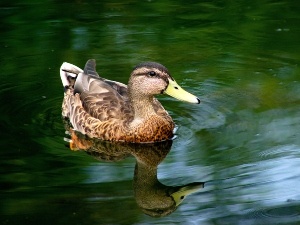
If your duck’s eggs have not changed since the bird laid them then you have nothing to worry about, but if your duck’s eggs have changed in appearance during incubation then you’d be right to be worried.
Dark spots developing on the bird’s eggs qualify as a significant change, and this article explores why this happens.
Table of Contents
Dark spots on duck eggs:
Duck eggs can look quite different from each other, some eggs are small, some are medium, and some large, some eggs come out white, light green, or even light blue, but a sudden change in how the egg looks can happen because of one of two reasons:
A bad egg:
One reason why your bird’s egg may be developing dark spots on them may be because the eggs are going bad.
Not all eggs that you incubate will reach the end of their incubation cycle to hatch and produce ducklings, some eggs will go bad during incubation and some will be bad before you even start incubating the eggs.
What to do:
You can check to see if the egg is viable by candling the egg. Candling the egg entails taking the egg into a dark room and shining a light against the back of it to see the inside.
You can use a candle to candle the egg, you can use a flashlight, or even an egg candler, to see what is inside the egg.
You can candle the egg from the 7th day of incubation.
A viable egg will have a network of veins inside the egg, you may also see a heartbeat inside a viable egg.
If the egg is clear when you candle it, if there is no heartbeat, no veins, and no mass in the egg, then the egg is likely bad
If you realize that you are currently incubating a bad egg then you’d need to get rid of the egg. There is a chance that the egg will explode in the incubator if you leave it in there and let it keep incubating
Bruising:
If your birds are close to hatching, and the egg starts to develop a dark spot close to where the ducks bill would be, then this may simply be bruising from the inside of the egg
Ducklings who have not hatched yet have an egg tooth, this egg tooth is a sharp, hard, and solid portion of the bird’s bill that is meant to help the birds hatch properly.
When the bird is ready to hatch it will try to pip the eggshell with this egg tooth.
If the bird doesn’t successfully pip the egg, then the duck will rather bruise the inside of the shell while trying to begin the hatching process causing one or more dark spots on the shell that can be seen on the outside.
While this isn’t common it does happen
What to do:
You would need to candle the egg to check whether the veins inside the egg are still vibrant and red, check that there is indeed a mass in the egg, and also check that this bruising is in fact close to where the bird’s bill is.
If you candle the egg, and the egg is still viable, then you can simply place the egg back in the incubator and leave it alone until the duckling hatches out of it.
If you enjoyed this article then you may also be interested in other duck related articles. Here are some articles that you may be interested in: Duck Eggs Turning Grey, Vinegar And Ducks, How To Stop Ducks Laying Eggs In My Yard, Duck Only Sitting On Eggs At Night, How To Stop Ducks From Laying Eggs, Vinegar In A Duck Pool, Duck Poop Stains In Pool

